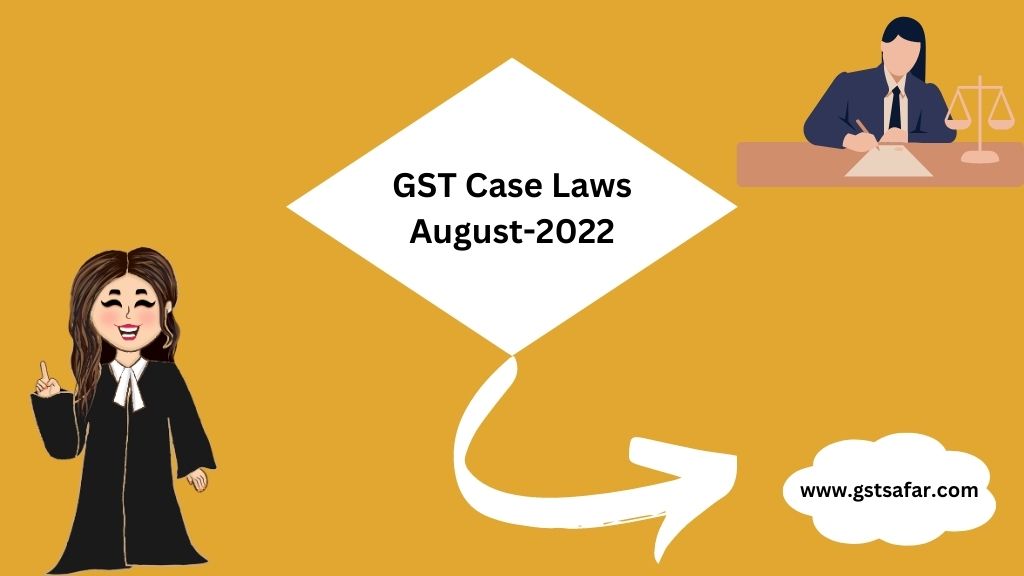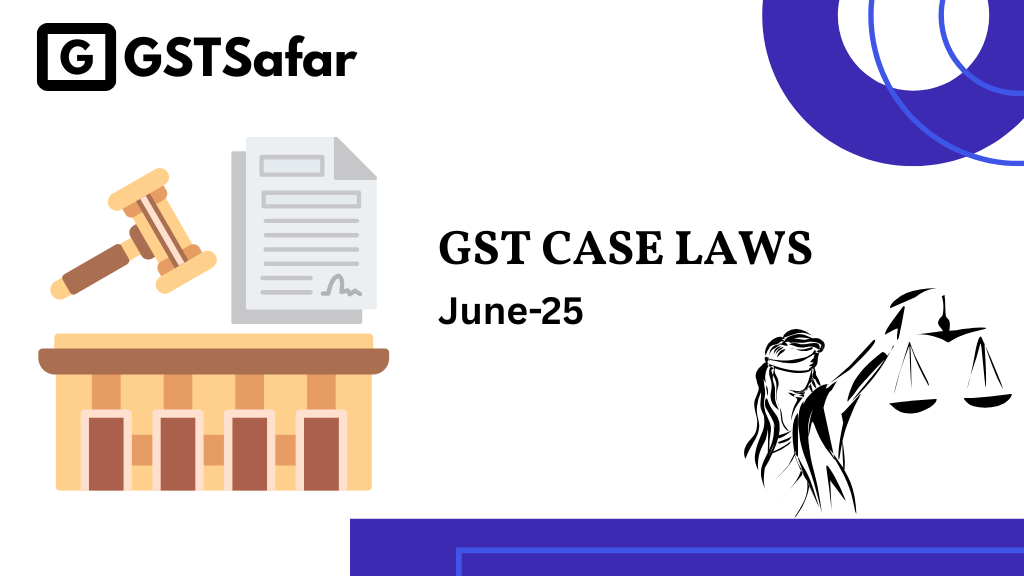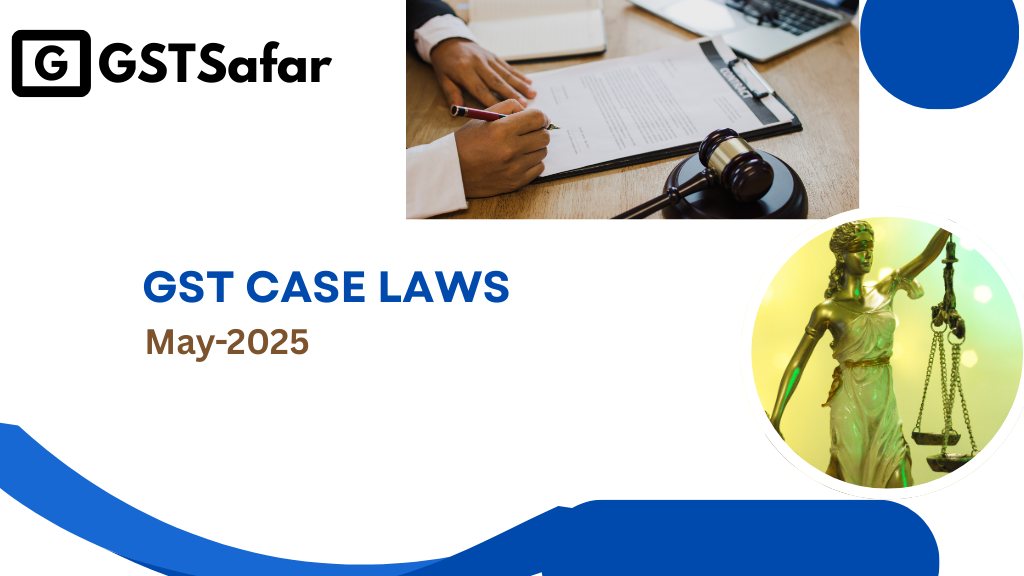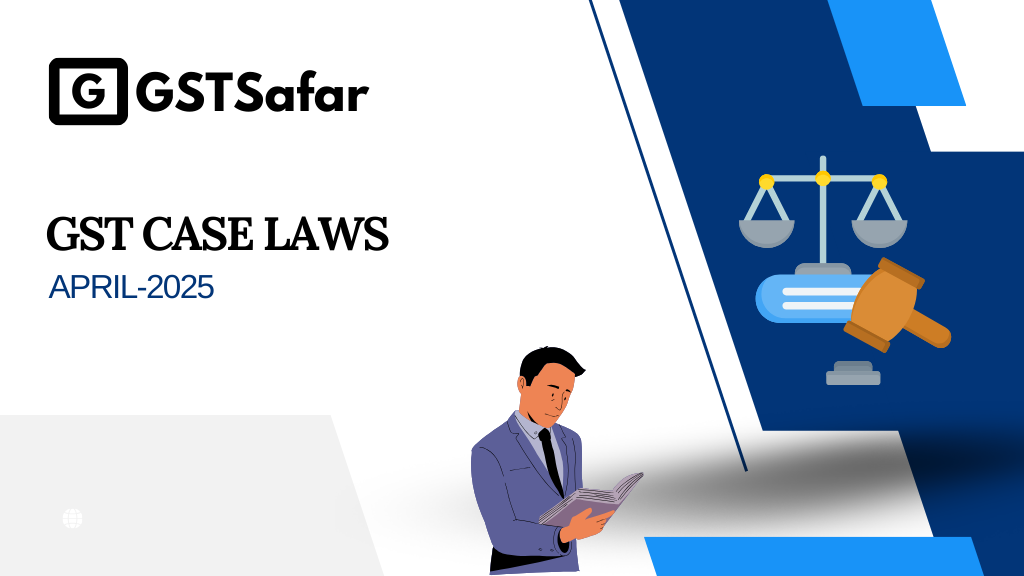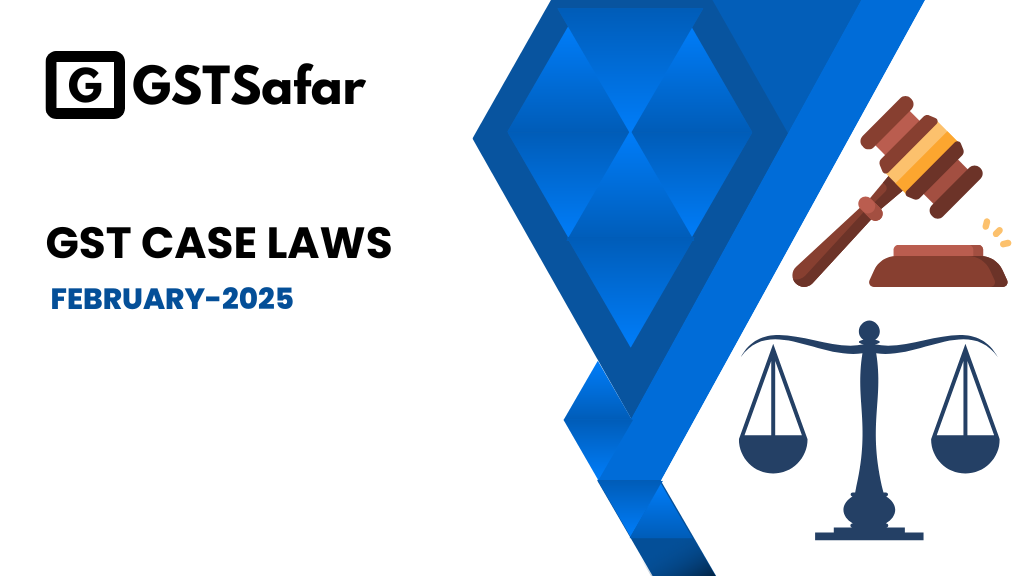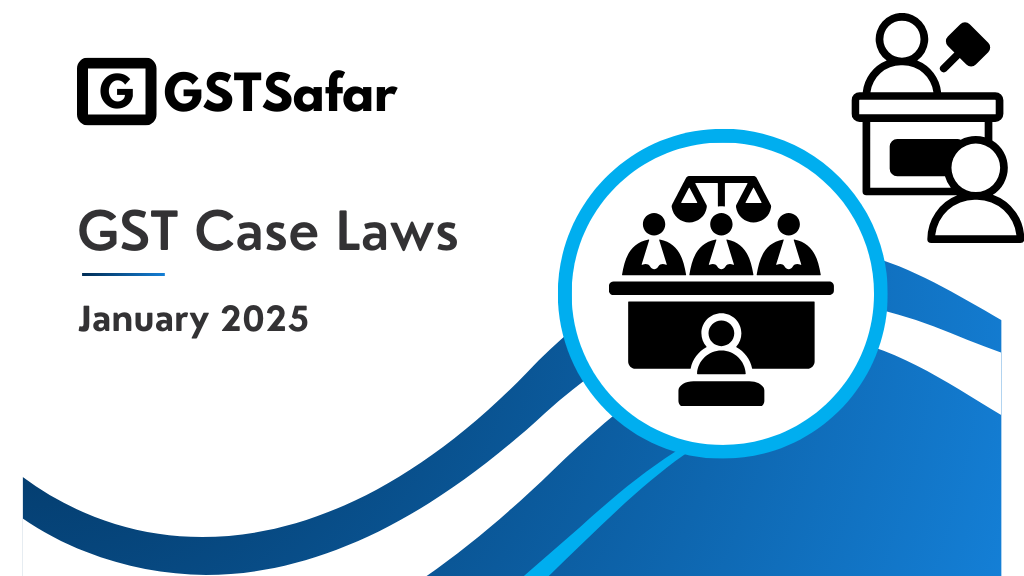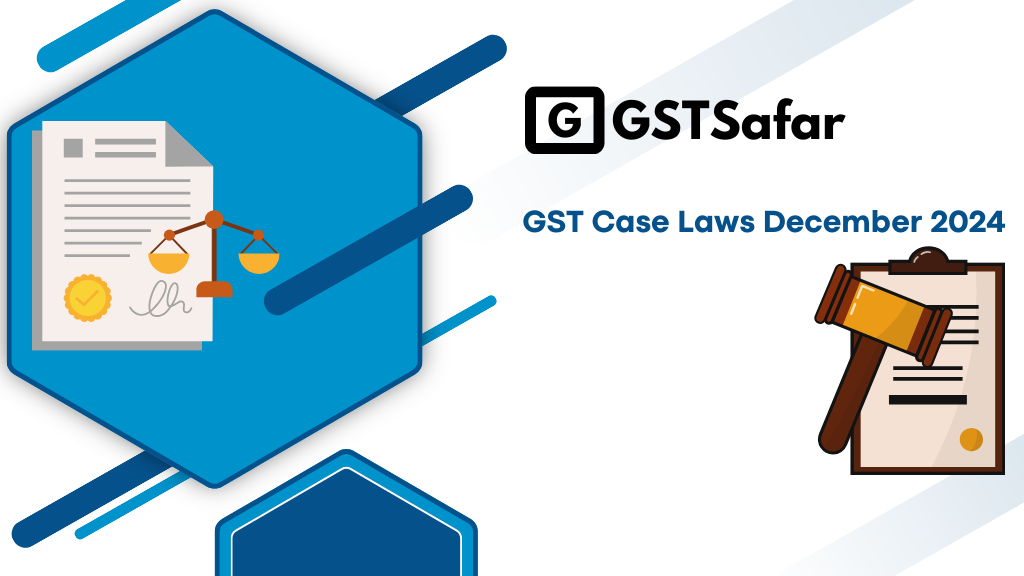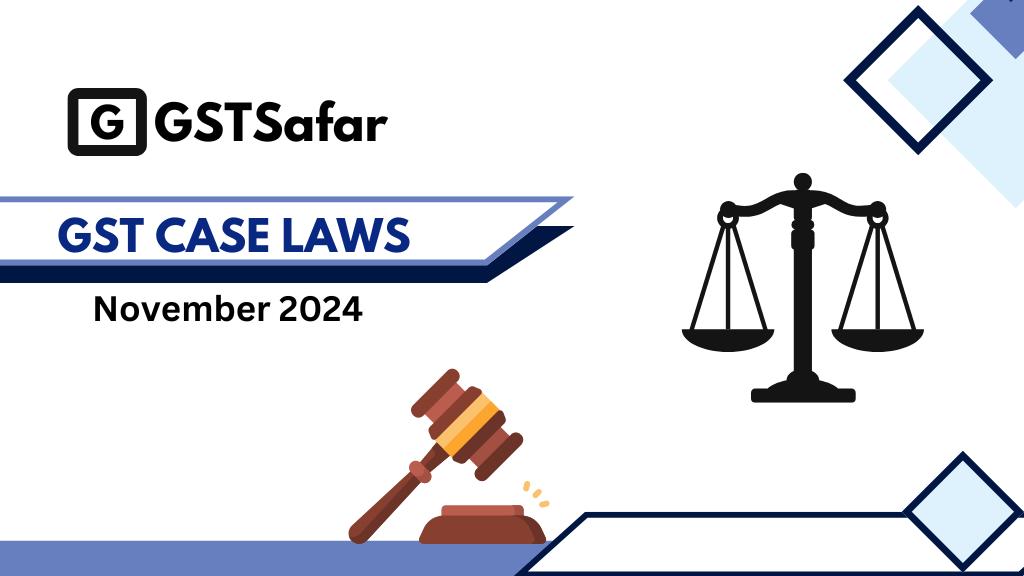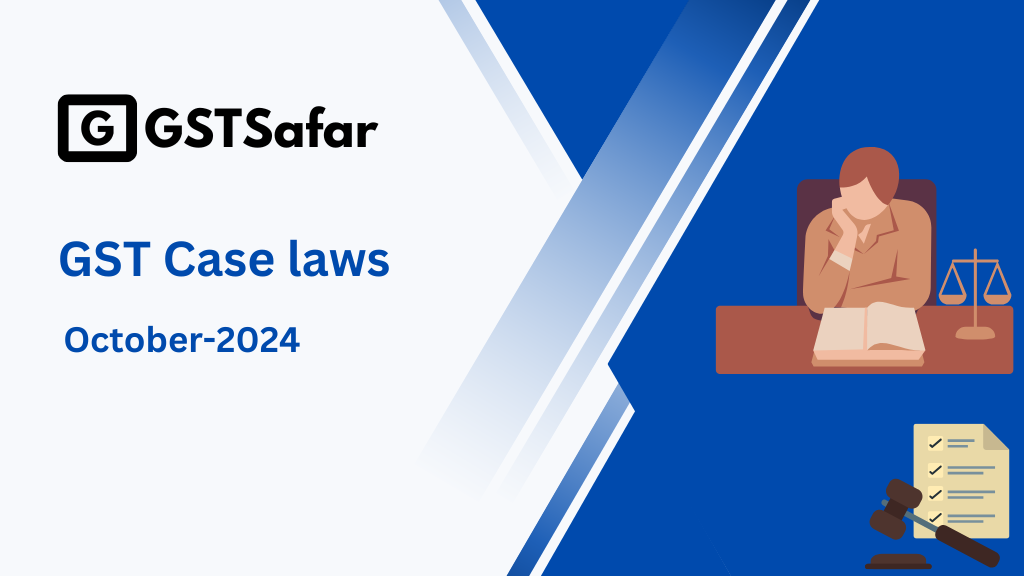The goal of this article is to cover all recent GST case laws 2022. All latest high court judgement on gst and all latest supreme court judgments on gst issued in August 2022 have been covered in this article. All latest GST case laws of August 2022 in this article have been classified by name, date, judge, counsel, GST concept, GST section, etc. In addition, a PDF of the GST case law is provided with the case law so that the user can download it for further study.
Table of Contents
ToggleGST Case law on Bail for fraudulent availment of ITC | Recent GST Case Laws 2022
Punjab & Haryana High Court says bail can not be denied if final report is filed after investigation and triple test is satisfied
| High Court : Punjab & Haryana High Court Judgement 2022 |
| Name of case : Maninder Sharma vs. State Tax Officer |
| Date of Judgment : 31-08-2022 |
| Appeal No : CRM-M- NOS. 24033 AND 36121 OF 2021 (O&M) |
| Judges : JASJIT SINGH BEDI, J. |
| Counsel Name : A.S. Shera, Vishal Sodhi, Shiv Kumar, S.S. Grewal, P.S. Aulakh,Kirat Singh Sidhu |
| Fact of the Case: The accused petitioners have been in custody for a total period of around 1 year and 6 months to date, while the maximum sentence that could be imposed is 5 years. However, even the charges have not been framed yet, and there are still 66 prosecution witnesses yet to be examined. |
| Held by court : Hence, it is evident that the trial cannot be concluded in the near future. Additionally, the prosecution has not expressed any serious concerns about the petitioners being flight risks, tampering with evidence, or influencing witnesses if they are granted bail. Moreover, the evidence primarily consists of documentary material, which is already in the custody of the State. Therefore, the petitioners should be granted bail with certain conditions.When granting bail, the triple test or tripod test becomes relevant, which includes the following considerations: (i) Whether the accused is likely to flee or be a flight risk; (ii) Whether the accused will tamper with evidence if granted bail; and (iii) Whether the accused could influence witnesses if granted bail. In cases of economic offences, once the investigation is complete and the triple test is satisfied, the denial of bail should be the exception rather than the rule. However, the court may also grant bail prior to the completion of the investigation if the facts justify it. |
| In favor of : Assessee |
| Topic of GST : Bail in case of Wrong availment of ITC |
| Section of GST: Section 132 of CGST Act,2017 |
GST Case law on Provisional attachment of Bank accounts | Recent GST Case laws 2022
Allahabad High Court says provisional attachment should passed after satisfying all the conditions
| High Court : Allahabad High Court Judgement 2022 |
| Name of case : Varun Gupta vs. Union of India |
| Date of Judgment : 29-08-2022 |
| Appeal No : WRIT TAX NO. 858 OF 2022 |
| Judges : SURYA PRAKASH KESARWANI AND JAYANT BANERJI, JJ. |
| Counsel Name : Alok Saxena |
| Fact of the Case: The writ petition filed earlier resulted in the quashing of the provisional attachment due to the absence of pending proceedings. However, the Commissioner immediately issued a second order for the provisional attachment of the bank account. A writ petition was filed to challenge this second order and seek its quashing. |
| Held by court : No proceedings had been initiated under Section 74 of the CGST Act 2017. The Commissioner passed the impugned order without stating his opinion and providing tangible evidence to justify the need for the order to protect the interest of revenue. The impugned order does not meet the requirements of Section 83 of the CGST Act and was passed in an arbitrary and illegal manner, therefore it should be invalidated .The binding decision of the Supreme Court was deliberately and completely ignored .A cost of Rs. 50,000 was imposed on the department and it should be paid to the petitioner. The opinion must be formed prior to issuing the provisional attachment order, and the opinion should clearly state that the attachment is necessary to safeguard the government revenue. The order must be in writing and the Commissioner must adhere to the relevant rules while exercising this power. The formation of the opinion must be directly related and connected to the purpose of protecting the government revenue. The Commissioner cannot exercise discretionary power without proper guidance. |
| In favor of : Assessee |
| Topic of GST : Provisional attachment of Bank account |
| Section of GST: Section 83 of CGST Act,2017 |
GST Case law on Interest on late filling of Return | Recent GST case laws 2022
Madras High Court says interest would be levied on tax liability.
| High Court : Madras High Court Judgement 2022 |
| Name of case : India Yamaha Motor (P.) Ltd. vs. Assistant Commissioner |
| Date of Judgment : 29-08-2022 |
| Appeal No : W.P. NO.19044 OF 2019 W.M.P. NO.18404 OF 2019 |
| Judges : DR. ANITA SUMANTH, J. |
| Counsel Name : N. Prasad |
| Fact of the Case: The petitioner had not submitted turnover returns for a specific period and the tax payments for those periods were delayed. As a result, interest was imposed . The petitioner argued that it had enough credit available in both the electronic cash ledger and electronic credit register. Therefore, there was no loss incurred by the revenue, and thus, there was no valid reason to impose interest, as interest is solely compensatory in nature. |
| Held by court : The availability of electronic credit does not imply its utilization as payment – Merely having electronic credit does not exempt the petitioner from the imposition of interest. The authorities cannot assume that the available credits in the Registers will be automatically set off against the tax liability unless the assessee actually files a return and debits the respective Registers. Therefore, the imposition of interest was justified |
| In favor of : Revenue |
| Topic of GST : Interest on Late Filling of return |
| Section of GST: Section 50 of CGST Act,2017 |
GST Case law on ISD Credit | Recent GST Case laws 2022
Bombay High Court says The department should establish a common portal to enable the petitioner’s recipient units to file revised declarations in Form GST TRAN-1, allowing them to claim the credit that has already been distributed to them by the ISD.
| High Court : Bombay High Court Judgement 2022 |
| Name of case : Colgate Palmolive (I) Ltd. vs. Union of India |
| Date of Judgment : 29-08-2022 |
| Appeal No : WRIT PETITION NO.2168 OF 2021 |
| Judges : K.R. SHRIRAM AND A.S. DOCTOR, JJ. |
| Counsel Name : Jitendra Motwani, Chirag Shetty and Rizwan Khatri |
| Fact of the Case: The petitioner submitted a declaration for transitioning credit under section 140 within the specified timeframe and in the prescribed manner. The transition of the aforementioned CENVAT credit was authorized and credited to the Electronic Credit Ledger (ECL) of their Input Service Distributor (ISD) registration on the GST common portal. The petitioner issued invoices to transfer the transitional credit and disclosed this transfer to the recipient units through Column 9 of Table 8 in Form GST TRAN-1.However, a show cause notice was issued to the petitioner, alleging that they had incorrectly transitioned the balance of ISD credit in Form GST TRAN-1. It was claimed that the ISD was not eligible to directly carry forward its balance credit to the electronic credit ledger maintained under the GST regime under section 140(1). |
| Held by court : The entire dispute solely revolved around the procedure for transitioning the CENVAT credit, specifically the balance of ISD credit, and its distribution to other units within the petitioner’s department. The contention was that this distribution should have been directed through the open common portal, allowing the recipient units of the petitioner to file revised declarations in Form GST TRAN-1 to claim the credit that had already been distributed to them through invoices issued by the petitioner’s ISD registration. |
| In favor of : Assessee |
| Topic of GST : ISD Credits & Transitional Provision |
| Section of GST: Section 140 of CGST Act,2017 |
GST Case law on Works contract service | Recent GST Case laws 2022
Andhra Pradesh High court says license fees paid for works contract for maintenance of toilets at bus station exempt from tax.
| High Court : Andhra Pradesh High Court Judgement 2022 |
| Name of case : Rajeev Yuvajana Sangham vs. State of A.P |
| Date of Judgment : 24-08-2022 |
| Appeal No : WRIT PETITION NO.16162 OF 2022 |
| Judges : C. PRAVEEN KUMAR AND A.V. RAVINDRA BABU, JJ. |
| Counsel Name : Sreekanth Reddy Ambati, |
| Fact of the Case: The petitioner was awarded the works contract for the maintenance of toilets at the bus station belonging to the respondent, and the petitioner paid a monthly license fee to the bus station. |
| Held by court : Monthly license fee paid by petitioner to bus station was exempt from Tax in view of Notification No. 12/2017-C.T. (Rate), dated 28-6-2017, |
| In favor of : Assessee |
| Topic of GST : Works contract service |
| Section of GST: Section 2(119) and Section 11 of CGST Act,2017 |
GST Case law on Refund | Recent GST Case laws 2022
Andhra Pradesh High Court says it is necessary to reconsider the matter when refund application is rejected despite of particular notifications in this regard.
| High Court : Andhra Pradesh High Court Judgement 2022 |
| Name of case : TGV Sraac Ltd .vs. Assistant Commissioner (ST) |
| Date of Judgment : 23-08-2022 |
| Appeal No : WRIT PETITION NO. 30152 OF 2021 |
| Judges : C. PRAVEEN KUMAR AND DR.V.R.K.KRUPA SAGAR, JJ |
| Counsel Name : P. Karthik Ramana |
| Fact of the Case: The petitioner, who was involved in the business of trading coal, filed an application for the refund of taxes paid on the said supplies for the tax period spanning from July 2017 to March 2019. The petitioner submitted the refund application on 15-9-2021, following which a notice was issued to reject the aforementioned application. |
| Held by court : In light of Notification No. 13/2022-Central Tax, dated 5-7-2022, it is evident that the period between March 2020 to February 2022 is to be excluded for the purpose of calculating the limitation period for filing a refund under section 54 or section 55. Therefore, considering this provision, the petitioner’s refund application was filed within the prescribed limitation period. Consequently, the matter needs to be reconsidered. |
| In favor of : Assessee |
| Topic of GST : Refund |
| Section of GST: Section 54 of CGST Act,2017 |
GST Case law on Registration | Recent GST Case laws 2022
Madras High Court says that registration should be restored on payment of tax and penalty and filing of returns
| High Court :Madras High Court Judgement 2022 |
| Name of case : Pearl and Co. vs. Commissioner of Commercial Taxes |
| Date of Judgment : 23-08-2022 |
| Appeal No : W.P.(MD)NO. 19127 OF 2022 W.M.P.(MD).NO. 13962 OF 2022 |
| Judges : M. NIRMAL KUMAR, J |
| Counsel Name : S.Karunakaran |
| Fact of the Case: The registration was canceled due to the non-filing of returns, and the request for revocation of the registration cancellation was rejected on the grounds that it was barred by time limitations. |
| Held by court : The restoration of the canceled registration would not harm the department; on the contrary, it would have been advantageous for the state to generate revenue the canceled registration was required to be reinstated upon payment of tax and penalty, along with the filing of returns. |
| In favor of : Assessee |
| Topic of GST : Registration |
| Section of GST: Section 30 of CGST Act,2017 |
GST Case law on Real estate | Recent GST case laws 2022
National Anti -Profiteering authority directed to pass the ITC to the customer with 18% interest
| High Court : National Anti- Profiteering Authority Judgement 2022 |
| Name of case : Sunil Saraf vs. Paramount Propbuild (P.) Ltd. |
| Date of Judgment : 23-08-2022 |
| Appeal No : CASE NO. 60 OF 2022 |
| Judges : AMAND SHAH, TECHNICAL MEMBER & CHAIRMAN PRAMOD KUMAR SINGH AND HITESH SHAH, TECHNICAL MEMBER |
| Counsel Name : |
| Fact of the Case: The respondent, who was involved in the construction business, provided construction services by constructing flats for sale. Out of a total of 1224 flats booked, 1039 flats were booked prior to the implementation of GST, while 185 flats were booked during the GST regime. After the implementation of GST, the respondent benefited from an additional Input Tax Credit (ITC) equivalent to 2.43% of the turnover. However, the benefit of ITC was not passed on, as evidenced by the absence of authentic acknowledgement receipts to substantiate the same. Furthermore, negative confirmations received from some homebuyers clearly indicated that they had not received the benefit of ITC. |
| Held by court : The respondent was mandated to be directed to pass on the additional benefit of Input Tax Credit (ITC) to customers, along with an interest rate of 18%. Additionally, a penalty was also to be imposed. |
| In favor of : National antiprofiteering authority |
| Topic of GST : ITC passing to customer |
| Section of GST: Section 171 and Rule 133 of CGST Rules 2017 |
GST Case law on Input Tax credit | Recent GST Case Laws 2022
Bombay High Court direct to reopen GST portal in order to file TRAN-1 and TRAN-2 for availing transitional credit
| High Court : Bombay High Court Judgement 2022 |
| Name of case : Unichem Laboratories Ltd. vs. Union of India |
| Date of Judgment : 23-08-2022 |
| Appeal No : WRIT PETITION NOS. 262 AND 1479 OF 2019, 109 OF 2020, 2786 OF 2021 AND 1646 OF 2022 |
| Judges : K.R. SHRIRAM AND GAURI GODSE, JJ. |
| Counsel Name : Jitendra Motwani, Nishant Shah, Ms. Virangana Wadhawan, Neeraj Hande, Rohan P. Shah, Udayan Choksi, Sabari Rajan, Vikram Nankani, Sr. Adv., Prasad Paranjape and Sanjeev Nair |
| Fact of the Case: Petitions were filed addressing procedural challenges and objections related to the distribution, utilization, and eligibility of Input Service Distributor (ISD) credit for Service Tax/excise duty under section 140 of the CGST Act, 2017. The respondent commonly objected that the ISD credit could not be directly transitioned into the Electronic Credit Ledger (ECL) under the GST regime. They argued that the ISD credit should have been distributed by the ISD to its various units/offices prior to 1-7-2017, and subsequently, the transferee units/offices should have filed TRAN-1 to transition the distributed credit into their respective ECL. |
| Held by court : In order to assist assessees in overcoming procedural and technical challenges, the department was instructed by the Supreme Court to establish a common portal. This portal would facilitate the filing of the necessary forms, such as TRAN-1 and TRAN-2, to avail transitional credit in accordance with the court’s directions. |
| In favor of : Assessee |
| Topic of GST : Input Tax Credit |
| Section of GST: Section 140 of CGST Act,2017 |
GST Case law on Input Service Distributor | Recent GST Case laws 2022
Bombay High Court says Considering the challenges encountered in transitioning pre-GST ISD credit to the GST regime, it is essential to allow the petitioners to file or revise their TRAN-1 within the timeframe prescribed in the Filco Trade Centre case. Additionally, the Central Board of Indirect Taxes and Customs (CBIC) should provide a clarification pertaining to the distribution and reporting of ISD credit.
| High Court : Bombay High Court Judgement 2022 |
| Name of case : Siemens Ltd. vs. Union of India |
| Date of Judgment : 23-08-2022 |
| Appeal No : WRIT PETITION NO. 986 OF 2019 AND 9715 OF 2022 & OTHERS INTERIM APPLICATION NO. 3665 OF 2020 |
| Judges : K.R. SHRIRAM AND GAURI GODSE, JJ. |
| Counsel Name : Vikram Nankani, Jitendra Motwani, Nishant Shah |
| Fact of the Case: Due to procedural and functional challenges faced in the GST portal, the petitioners were unable to distribute and report Input Service Distributor (ISD) credit before 1-7-2017. In the Filco Trade Centre case, the Supreme Court directed the GST Network to establish a common portal for filing or rectifying TRAN-1/TRAN-2 for a specific period. The petitioners are required to file or revise their TRAN-1 within the timeframe specified in the aforementioned case. The filing or revision of TRAN-1 should be based on manual ISD invoices raised or to be raised, with the aggregate credit not exceeding the available ISD credit with the petitioner. |
| Held by court : It is imperative for the Central Board of Indirect Taxes and Customs (CBIC) to provide a clarification regarding the distribution and reporting of Input Service Distributor (ISD) credit. The department should duly verify the authenticity of the claim and issue an appropriate order accordingly. |
| In favor of : Assessee |
| Topic of GST : Credit Distribution in case of Input Service Distributor |
| Section of GST: Section 140 of CGST Act,2017 |
GST Case law on Arrest & Remand | Recent GST Case laws 2022
Gujarat High court says Police custody application is not maintainable after expiry of 15 days from date of arrest and remand.
| High Court : Gujarat High Court Judgement 2023 |
| Name of case : Yogeshbhai Naginbhai Vora vs. State of Gujarat |
| Date of Judgment : 22-08-2022 |
| Appeal No : R/SPECIAL CRIMINAL APPLICATION NO. 7720 OF 2022 |
| Judges : NIRAL R. MEHTA, J |
| Counsel Name : Jal Soli Unwala, Sr. Counsel and Vijay H. Patel |
| Fact of the Case: The petitioner, along with other co-accused, established a fictitious firm through which they engaged in economic offenses by fraudulently claiming Input Tax Credit without any actual transportation of goods. The petitioner was arrested on 6-7-2022 and was presented before the respective Magistrate on the same day, seeking a 14-day remand. However, the Magistrate denied the remand application. The order was promptly appealed before the Sessions Judge on 8-7-2022, resulting in a partial grant of remand for seven days on 22-7-2022. The petitioner remained in custody from the date of arrest, i.e., 6-7-2022, until the date of the order, i.e., 22-7-2022, without any specific remand order from the Magistrate. The question arises whether the Court could order police custody or remand of the petitioner when the initial 15-day period had expired. |
| Held by court : The petitioner’s argument that there cannot be an order of remand once the initial 15 days from the date of arrest have expired was not accepted. It is worth noting that there is a provision that prevents the court from granting a remand order once the 15-day period has lapsed. The initial period of 15 days begins running from the date of arrest and includes the first remand, whether in judicial or police custody. In the present case, while the Magistrate rejected the demand for remand in police custody, no remand in judicial custody was granted. Therefore, the completion of the initial 15-day period would not be detrimental to the Investigation Agency. The order passed by the Sessions Judge granting a seven-day remand cannot be deemed illegal and should be upheld. |
| In favor of : Revenue |
| Topic of GST : Arrest and remand |
| Section of GST: Section 132 of CGST Act,2017 |
GST Case law on Appeal to Appellate authority | Recent GST Case laws 2022
Karnataka High court says According to established legal precedents, when an appeal is filed electronically within the prescribed period but the physical copy is submitted after the prescribed period, it cannot be concluded that the appeal was filed beyond the prescribed period.
| High Court : Karnataka High Court Judgement 2023 |
| Name of case : G.G. Agencies Girijeshwar Rice Mill vs. State of Karnataka |
| Date of Judgment : 18-08-2022 |
| Appeal No : WRIT PETITION NO. 15344 OF 2022 (T-RES) |
| Judges : S.R. KRISHNA KUMAR, J. |
| Counsel Name : Sri. Dakshina Murthy. R. and Smt. M. Mahalakshmi, |
| Fact of the Case: The assessee filed an appeal under section 107 against the order passed by the department. However, the appellate authority dismissed the appeal on the basis that it was time-barred. |
| Held by court : As per established judicial precedents, if an appeal is electronically filed within the prescribed period and a certified copy is subsequently filed physically, it cannot be inferred that the appeal was filed beyond the prescribed period. |
| In favor of : Assessee |
| Topic of GST : Appeals to appellate authority |
| Section of GST: Section 107 of CGST Act, 2023 |
GST Case law on Demand | Recent GST Case laws 2022
Jharkhand High Court says matter was readjudicated on violation of principal of natural justice
| High Court : Jharkhand High Court Judgement 2023 |
| Name of case : Om Prakash Store vs. State of Jharkhand |
| Date of Judgment : 18-08-2022 |
| Appeal No : W.P. (T) NOS. 1526 & 1527 OF 2022 |
| Judges : APARESH KUMAR SINGH AND DEEPAK ROSHAN, JJ. |
| Counsel Name : Sumeet Gadodia and Mrs. Shilpi Sandil Gadodia |
| Fact of the Case: The show cause notice in Form GST DRC-01 was issued negligently, as it failed to mention the date, time, and venue. Subsequently, an adjudication order under section 73 was passed without providing the petitioner with any prior information or notification. Additionally, a summary of the order in Form GST DRC-07 was issued. The petitioner remained unaware of the existence of any order until the bank attachment notice, as specified in GST DRC-13 under section 79(1)(c), was sent to the petitioner’s bank, resulting in the attachment of the petitioner’s bank account as per Form GST DRC-07. This was the first instance in which the petitioner became aware of the adjudication proceedings and the orders passed by the respondent authorities. |
| Held by court : The petitioner was not provided with a proper opportunity of hearing before the adjudication order was passed. The statutory requirements outlined in sections 73 and 75 were not followed, resulting in a violation of the principles of natural justice. Consequently, the matter was to be remitted back to the adjudicating authority. The authority was directed to issue a fresh show cause notice and, after granting the petitioner a fair opportunity, pass a fresh order. |
| In favor of : Assessee |
| Topic of GST : Demand & Show Cause Notice |
| Section of GST: Section 73 of CGST Act,2017 |
GST Case law on Lotteries | Recent GST Case Laws 2022
Supreme Court reject review petition filed against the ruling .
| Supreme Court Judgement 2022 |
| Name of case : State of Meghalaya vs. State of Karnataka |
| Date of Judgment : 17-08-2022 |
| Appeal No : REVIEW PETITION (C) NO.878 OF 2022 AND CIVIL APPEAL NOS.10466-10476 OF 2011 |
| Judges : M.R. SHAH AND B.V. NAGARATHNA, JJ. |
| Fact of the Case: This case has Legislative competence for levy tax between state government |
| Held by court : It was determined that a State possessed the legislative authority, as per the Constitution of India, to impose taxes on lotteries organized by the Government of India, Government of a State, Union Territories, or any other country. The application for listing a review petition in open court was denied, and the Supreme Court further dismissed the review petition, noting that there was no evident error on the face of the record that warranted reconsideration of the challenged order. |
| In favor of : Respondent |
| Topic of GST : Lotteries |
| Section of GST: Article 246 of Constitution of India |
GST Case law on HSN Code | Recent GST Case Laws 2022
Supreme court says the court, in exercising judicial review, did not have the power to compel the appellant to seek clarification from GST authorities if there was no statutory obligation to do so or if it was not mandated by the terms of the bidding documents.
| Supreme Court Judgement 2023 |
| Name of case : Union of India vs. Bharat Forge Ltd |
| Date of Judgment : 16-08-2022 |
| Appeal No : CIVIL APPEAL NO. 5294 OF 2022 |
| Judges : K.M. JOSEPH AND HRISHIKESH ROY, JJ |
| Counsel Name : N. Venkataraman, and Amrish Kumar |
| Fact of the Case: The effect of the tender circular issued by the Railway was examined in light of the writ of mandamus. A writ of mandamus may be issued when a duty is wrongly exercised or not exercised by an authority who possesses the discretion to do so under the direction of another authority. This duty can arise from a statute, common charter, common law, customs, or contract. The writ of mandamus can be invoked when there is a public duty or a failure to perform an act, and the court is not bound by technicalities but primarily concerned with delivering justice.In this case, the circular issued by the Railway Board allowed the appellant Railways to indicate the Harmonized System of Nomenclature (HSN) code. However, this cannot be considered a public duty enforceable through a writ of mandamus. The circular conferred discretionary power to indicate the HSN code. As per the circular, tenderers were still required to quote the tax rate even after the HSN code and tax rate were indicated by the appellant. It would not be lawful to direct a statutory functionary like the Railways to exercise discretion in a specific manner unless it was absolutely necessary, just, and reasonable. Imposing such a direction would nullify the concept of discretionary power. Therefore, a writ of mandamus was not warranted in this case. The impugned order of the High Court, which had issued the writ of mandamus, was set aside. |
| Held by court : The High Court, in its challenged judgment, accurately stated that the court cannot delve into the specifics of contract terms. Unless the actions of the State were deemed arbitrary, illegal, mala fide, or in violation of any statute, the court could not review contractual matters. The court lacked the authority, through judicial review, to compel the appellant to seek clarification from GST authorities when there was no statutory obligation to do so or when it was not specified in the bidding documents. |
| In favor of : Revenue |
| Topic of GST : HSN Code |
| Section of GST: Section 59 & 60 of CGST Act,2017 |
